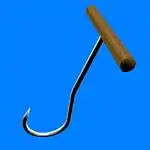āķis
Latvian

Āķis
.JPG.webp)
Āķis

Makšķeres āķi

Celtņa ākis
Etymology
Borrowed from Middle Low German hake or Middle Dutch haeck or an East Frisian word (compare Saterland Frisian Hoake (“hook”), German Haken), all ultimately from Proto-Indo-European *keg-, *kek- (“peg, hook; to bend”).[1]
Pronunciation
- IPA(key): [āːcis]
Noun
āķis m (2nd declension)
- hook (instrument with a curved extremity ending in a pointed tip, used to hang or suspend things)
- metāla, tērauda, kaula āķis ― metal, steel, bone hook
- iedzīt klintī āķus ― to drive hooks into the rock
- makšķeres āķis ― fishhook
- uzlikt ēsmu uz āķa ― to put the bait on the (fish)hook
- uzkabināt no āķa ― to hang (something) on a hook
- noņemt uz āķa ― to take something off the hook
- celtņa āķis ― crane hook
- a hidden or disguised intention or thought
- tur vajag būt kādam āķim ― there should be some hook (= hidden intention) there
- lūk, kur tas āķis! — look, there is the hook! (= that was the hidden intention)
Declension
References
- Karulis, Konstantīns (1992), “āķis”, in Latviešu Etimoloģijas Vārdnīca (in Latvian), Rīga: AVOTS, →ISBN
This article is issued from Wiktionary. The text is licensed under Creative Commons - Attribution - Sharealike. Additional terms may apply for the media files.